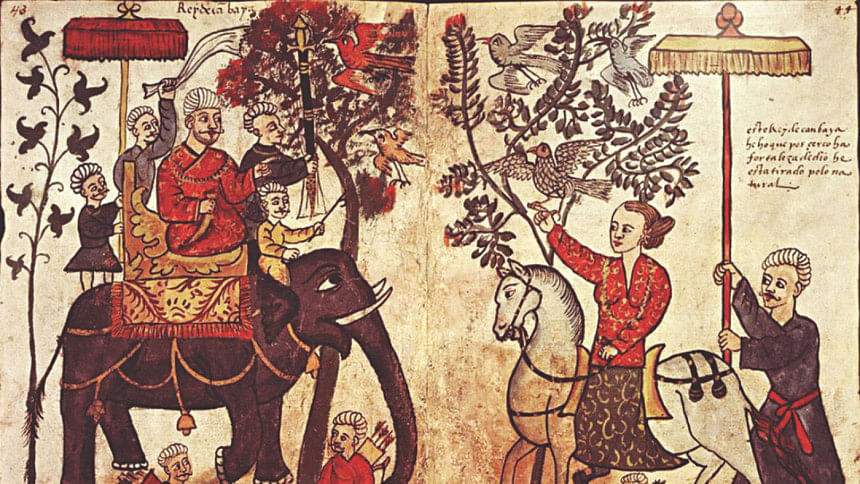Of 'crème de café’ and ‘dal tadka’ at interstices of alterity

'It is the inbetween space that carries the burden of the meaning of culture, and by exploring this Third Space, we may elude the politics of polarity and emerge as the others of ourselves.' ― Homi K. Bhabha, The Location of Culture
Two Bangladeshi dancers, a couple of Croatian-Canadians - one a well-known film-maker and another a student of political thought - and a German Professor of Comparative Mythology, chatting over cheese and wine, in a quiet Toronto neighborhood, was almost a surreal coming together of alterity or 'otherness'.
The newly married couple, Tahmina Anika, from Dhaka, and Zoran Swanson, from Toronto, had invited me to join them at Zoran's god-mother, Gabriella Martinelli and her husband Max Fischer's house for a quiet lunch. I was there to reinforce the young couple's invitation, to our hosts, to join in their upcoming wedding reception in Bangladesh.
Though once quoted to have said, 'I just do what I love. I haven't changed the world or anything', the quiet and unassuming Martinelli has quite a formidable bulk of work in her name, both as a documentary film-maker and a producer. She's worked with some of the biggest names in film - David Cronenberg, Baz Luhrmann, Leonardo DiCaprio, Clive Barker, Jeremy Irons, and now Sophia Loren and her son, Edoardo Ponti. And her filmmaking CV includes credits on M. Butterfly, Romeo + Juliet, Naked Lunch, Dead Ringersand My American Cousin. Her spouse Max Fischer, on the other hand, is more the truth-seeker, who has moved away from the complexities of German philosophy to a retired life dedicated to studying the work of Edmond Szekely, the founder of Rancho La Puerta, a unique fitness retreat based on traditional and indigenous understanding of nature and human community.
That lazy afternoon, we epitomized, influential cultural and post-colonial theorist, Bhabha's 'Third Space', referring to the interstices between colliding cultures, a liminal space 'which gives rise to something different, something new and unrecognizable, a new area of negotiation of meaning and representation.'
Gabriella's curiosity about dance in Bangladesh, led Anika and me to relating the history of our language movement, and soon to a discussion on eco-linguistics. As our hosts walked us to their favorite Indian restaurant, 'Bhoj', we discussed the importance of the stories we live by and how they form the cognitive structures in the minds of individuals or across a society, influencing how people treat each other, other animals, plants, forests, rivers and the physical environment. Our discussion on languages continued, through a delicious meal of 'dal tadka and rice', and Max informed us that, 'The wisdom of humanity is coded in language and once a language dies, the knowledge dies with it.'
'What does being a God-mother signify?', I ask. This leads Gabriella down memory lane, as she poignantly recollects how she and Zoran's late mother were childhood friends who had both traveled by boat with their families from Split, in Croatia, to Canada in the early 1950s; how their mothers tailored similar clothes for them for school; and how it was only natural that she was chosen as a godparent to take an interest in her friend's child's upbringing and to take care of the child should anything happen to the parents. 'All the more reason to visit Bangladesh', I reply.
In consonance with the expansive mood of inclusiveness, Gabriella insists that we move on to the nearby pizzeria, Caffe di Portici, for dessert. There I was introduced to 'crème de café', literally and deliciously, cream of coffee. As I relish the treat, I vaguely remember reading about the Italian traveler, De Varthema and seeing sketches of India related to his travels there in the 16th century, giving historicity to cross-cultural encounters.
When our conversation veers towards my work with the 'snake litanies' of Manasa and other myths of Bengal, Max, smilingly quotes, 'Myths are stories about the way things never were, but always are'.
I quietly bid adieu, understanding how a place can simultaneously 'be' and 'not be' familiar.
Back home, I curiously downloaded Max Fischer's insightfully annotated translations of Herman Hesse's poems 'The Seasons of the Soul', to read,
'Every blossom wants to become fruit.
Every morning turns into evening without regret.
Nothing on earth is eternal
except change, except taking leave.'

 For all latest news, follow The Daily Star's Google News channel.
For all latest news, follow The Daily Star's Google News channel. 



Comments